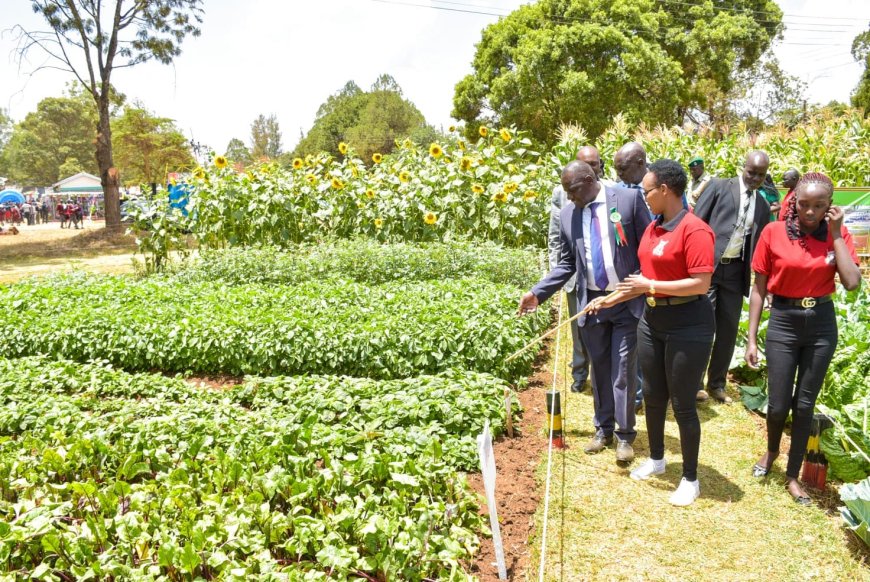Adoption of new technologies, boost for agricultural production

Uasin Gishu, Friday, May 17, 2023
KNA by Isack Kololo/Ekuwam Sylvester
In Uasin Gishu County, agriculture continues to be a crucial sector of the economy, providing employment and income to many rural households and the urban population.
The county is renowned for its high agricultural production, particularly in maize, wheat, and dairy farming.
Adoption of new innovations and technologies like use of biofertilizers, renewable energy among others in agricultural production has been key in leveraging productivity in the sector.
The county administration has been keen in supporting farmers by providing access to finance, trainings and field extension services to advise them on the recommended modes of farming to boost yields for particular high value crops like coffee, macadamia, passion fruits and others.
Uasin Gishu Governor Mr. Jonathan Chelilim affirmed his administration’s keenness in promoting competitive and commercially oriented agriculture through utilization of modern and efficient agricultural technologies.
He noted that these are key drivers in enhancing food security in the bread basket county that has continuously contributed to the country’s dairy and agricultural production.
“Food security remains a priority in my government; that is why I have prioritized agriculture in the budgetary allocation as a boost to the sector by directing funds to flagship programmes on value addition, crop diversification, establishment of small-scale irrigation schemes, post-harvest management and Agricultural Mechanization Services (AMS),” said Chelilim.
Recently, the county government announced plans to increase the amount of land under irrigation to boost agricultural productivity and ensure food security in the region. The initiative involves the construction of several water pans and dams in the county, aimed at providing a reliable source of water for irrigation throughout the year.
To address the issues of climate change in agriculture, the county government has invested in irrigation projects through the Kenya Climate Smart Agriculture Project (KCSAP) at a cost of Sh140 million.
Additionally, the County government disbursed funds to support farmer groups under the micro projects to a tune of Sh150 million.
Chelilim revealed that his administration will sensitize farmers on the need for crop diversification as a way of reducing over-reliance on maize and wheat by focusing more on the high value crops such as coffee, avocado, macadamia, tissue-culture bananas, passion fruits and pyrethrum.
He reiterated that farmers have a role to play in transforming agricultural production from subsistence to commercialization of farming as a business, noting that the county has allocated Shs. 12 million for the purchase and distribution of seedlings of the high value crops to farmers during the long rains season.
He further said the county government has always strived to cushion farmers against post-harvest losses through the construction of cereal stores across all the sub counties.
The county government has partnered with agricultural stakeholders to promote modern farming technologies and practices, with a focus on promoting sustainable agriculture and conservation of the environment.
Recently the county boss hosted a team from the embassy of the Kingdom of Netherlands to Kenya, International Finance Corporation (IFC) and the Warehouse Receipt System Council (WRSC) who deliberated on the ways to cushion farmers from post-harvest losses which had been a threat to food security and farmers income.
The Deputy Head of Mission Embassy of the Kingdom of Netherlands Mr Joris Bommel pointed out that farmers incur a lot of post-harvest losses which is a great threat to food security and farmers income. He added that that is a serious issue in the sector which needs to be addressed.
“By embracing Warehouse Receipt System (WRS) we can increase productivity and make sure that the income of farmers also increases. This is key in ensuring food security for the county and the country,” said Mr. Bommel.
The governor mentioned that they had discussed key areas of collaboration between the county government, Netherlands, IFC and the WRSC like agricultural research and development, trade and infrastructure to promote agricultural development in the county.
The areas of collaboration include combined technical assistance to farmers, improved access to credit, promoting value addition or strengthening the agricultural value chains.
The county has recently witnessed an increase in the production of maize, wheat, and dairy products. This has been attributed to the implementation of modern farming techniques and the use of high-quality seeds and fertilizers.
Courtesy; K.N.A
What's Your Reaction?



































































































































































































































































































